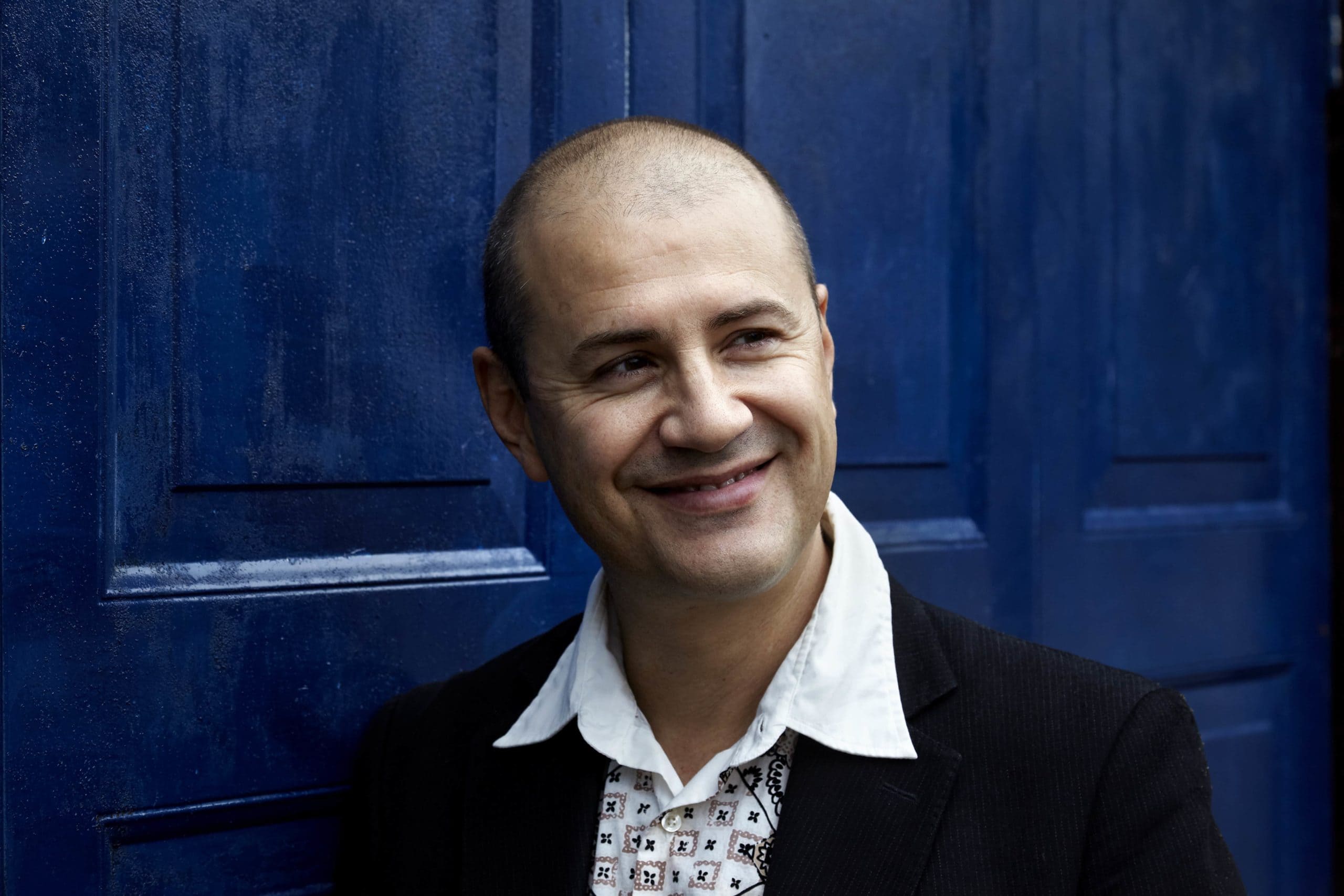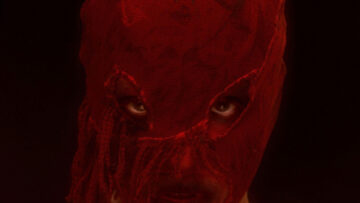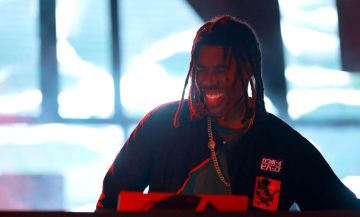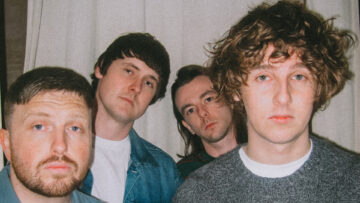

At the Pistoia Blues Festival, 1990, a performance by Clarence ‘Gatemouth’ Brown touched the soul of one young man and set the course of his life irrevocably on track.
“I was sitting in front of the stage,” Francesco Accurso recalls, with a fire in his eyes, “and then this old man comes out with all the leather – really, really skinny. And the sound, the image – everything – captured my imagination. I was totally taken by Blues then. I’d picked up an instrument a year before but this man was the real thing. He was so real, it conditioned me.”
The sound, the image – everything – captured my imagination. I was totally taken by Blues then. Clarence ‘Gatemouth’ Brown was so real, it conditioned me.
Since then, Accurso has lived a life full of that burning passion, moving from country to country until settling in London’s Harlesden and forging “a house all about music and art”, with a home studio where he predominantly works. Two of his children, touched by those same embers, are now at the beginning of their careers in the music industry, having recently been spotted performing in nearby Queens Park by the President of Atlantic Records.

Francesco playing alongside Lil’ Jimmy Reed. Credit: Betty Romani
Accurso has a credence of his own. Not only is he a member of the UK Blues Federation, but through his production company and record label, ToneTrade, he looks after the interests of the legendary saxophonist and original Sun Ra Arkestra member Knoel Scott, and Kathleen Pearson.
Accurso is presently working on the production of Pearson’s forthcoming album, My Roots. In this, he is bringing all his artistic and technical knowledge to bear. “My work is to design a package – so you have an image, you put words and music together and you create something that sort-of represents what you see out there. The principle of art is, in my experience and understanding: looking up at the world out there and representing it in a way that is a different window for other people to look at things. And it’s a different perspective.”
The principle of art is, in my understanding: looking up at the world and representing it in a way that is a different window for other people to look at things.
“So when recording, you capture the performance. If you can put some people in the room it’s even better because they will perform to the people as opposed to worrying about the sound, which is what we’ve been doing with this project with Kat. It’s like a real performance and you need to grab it – so you film it, sonically. And then I take this recording to my studio here and start fixing things.”

Put simply, Accurso’s goal as a producer is to help “make everything sound real”. This has been carried out against the backdrop of a music scene that, he believes, is losing its quality control, owing to the accessibility provided by common technologies.
Put simply, Accurso’s goal as a producer is to help “make everything sound real”
“The filter from the record labels is not there anymore – people now record in their rooms, release it on SoundCloud, and they can actually go to distributors and release their own material. You make your own sound, you have cheap speakers that you spent three, four, five hundred quid on, if that, you make your own music with a launchpad, get a beat, start rapping on it or doing your thing, then mix it how it sounds good in your ears and little cans.”
“Maybe you spend a little bit of time learning or looking stuff up. But, really, it took me twenty-five years working in production to get a sense of how mixing is done – it’s an artform. So nowadays artists do that and you can go on Spotify and stream all sorts of s*** that’s really done so badly.”

Kathleen Pearson’s new album, My Roots, is due to be released soon.
It would be easy to dismiss Accurso’s remarks as being those of an older, inflexible perspective. In reality, though, his protestations are not the grumblings of a senior generation, but are part of his larger, wiser musings on historical changes to the arts.
“Back in the day you would go to school and you would get an art book, of paintings by Da Vinci, for example, but you would never actually see any of those paintings, or maybe you would see a few if you were lucky enough to go to a museum. Now, you turn on your phone, you see millions of images – we’re bombarded.”
In the nineteenth and twentieth centuries, it was all about discovering what’s inside of ourselves – that’s changed completely with the internet
“The way we are presented with things is a lot quicker and a lot less focused on the content. And everything is flashy – an album comes out and it lasts a week, and that’s it. This fits the industry because they’re not going to sell millions of copies of an album any more. But they can sell a lot of stuff in a small amount of time and everything becomes a lot quicker.”

“At the beginning of the nineteenth and twentieth centuries, it was all about content, all about Freud, all about Jung, all about discovering what’s inside of ourselves – that’s changed completely with the internet and now everything is not in-depth, but all superficial.”
For Accurso, an intelligent romantic (“every word has weight – I’m one of those writers”), Blues music is where he chooses to go in-depth. In 2011, he was selected by Kathleen Pearson, an Afro-American Blues singer, to help renew the Blues for the modern era.
“She auditioned people and picked me. I was the third Italian musician she’d picked and I thought: ‘That’s strange; we’re in England and you go for three Italian musicians.’ At the time I was really impressed with what she said: ‘The way people in Spain and in Italy play the Blues is more connected to their roots,’ which is similar to what she experienced in the States.”
“The Blues that is promoted in this country is connected to British history – and I say that even though I’m British myself now, but in reality I come from Italy. The British Blues is a formula that was created in the late sixties, early seventies – it’s The Rolling Stones, The Who. This form of Blues Rock, which eventually became Rock, is great, but different.”

Francesco performing with Kathleen Pearson. Credit: Jennifer Noble.
It makes sense that Accurso craves that authentic Blues sound – he continues, after all, to be charged by the “realness” of Clarence ‘Gatemouth’ Brown’s performance he saw as a teenager. With this in mind, I ask him about his take on the Blues and whether, as Marco Pini put it to whynow, he considers it to be a style used to express an indefinable sorrow.
“There’s a misconception about Blues. I had the same feelings you describe, but Kat quite rightly explained to me that when people originally played the Blues they were playing to lift their spirits, not to commiserate themselves.”
There’s a misconception about Blues. When people originally played the Blues they were playing to lift their spirits, not to commiserate themselves.
“The hardship of their lives transpired in the music, of course, and that is what we perceive – you perceive that there is some sort of suffering in there because this was a hard life for these people, from slavery to their marginalisation. But after slavery it took a long time from to become organised, to create communities, to help each other. And music was a way of lifting the spirits.”

“It was interesting also that Blues was divided between Spiritual and actual Blues, the music of the Devil. People would play Spiritual, but would not play Blues or would do it secretly because otherwise they would be judged on it.”
You have all the gospel and spiritual culture and then you’ve got the Blues, something that is darker and more sexual. But we need both.
“So you have all the gospel and spiritual culture and then you’ve got the Blues, and with Blues you have something that is kind of darker, more sexual. But this is what the public needs; we need both. We need spirituality, but we also need sex and drugs and everything else.”
Amen to that.




